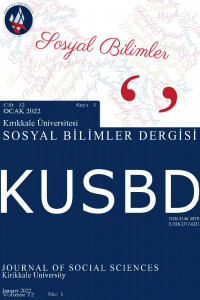GENERAL ALLENBY DÖNEMİNDE FİLİSTİN’DE ASKERİ YÖNETİM VE NEBİ MUSA OLAYLARI (1917-1920)
İngiltere’nin, 1917’de Filistin’i işgal ettikten sonra orada kurduğu askeri yönetim ülkenin yönetimi ve güvenliği konularında faaliyetini devam ettirmiştir. Buna göre askerler; bu iki alanda Filistin’de mevcut durumu korumakla yükümlüdür. Yönetim ile ilgili konuda Filistin, idari merkezlere ayrılmış ve askeri valiler görevlendirilmiştir. Valiler bulundukları ili yönetirken savaş koşullarına göre hareket etmiştir. Bu sayede askeri yönetim Filistin’de mevcut olan dengeyi korumuştur. Askeri yöneticilerin Filistin'de görevli olduğu diğer konu ise ülke güvenliğinin sağlanmasıdır. Askeri yöneticiler, Filistin'de güvenliği sağlama konusunda görevlerini yerine getirirken Londra Dış İşleri Bakanlığında alınan politik kararlardan ister istemez etkilenmiştir. Bu kararlardan birisi olan Londra Dış İşleri Bakanlığı’nın Filistin’de Siyonistleri destekleyerek bir Yahudi Ulusal Evi inşa etmek istemesi, Askeri yöneticileri Filistin'de güvenliği sağlama konusunda zor durumda bırakmıştır. Haliyle bu durum Filistin’de yaşayan Arapları da rahatsız etmiştir. 1920 yılı bahar aylarında gerçekleşen Nebi Musa Şenlikleri, Arap tepkisinin ilk kıvılcımı olmuş ve iki toplum çatışmıştır. Bu ise askeri yönetimin sona ermesini beraberinde getirmiştir.
Anahtar Kelimeler:
Filistin, Allenby, Askeri Yönetim, El Nebi Olayları
Military Administration in Palestine in General Allenby Period and Nabi Incidents (1918-1920)
After the occupation of Palestine by the United Kingdom in 1917, military ruling established there continued its activities in the areas of administration and security of the country. Accordingly, soldiers are responsible in these two areas of maintaining the current situation in Palestine. On the issue of administration, Palestine was divided into administrative centers and military governors were appointed. The governors acted according to the conditions of war when they ruled the province. At this point the military administration has maintained the balance that exists in Palestine. The other issue where the military commanders are in charge of Palestine is the security of the country. Military rulers were inadvertently influenced by the political decisions taken by the London Ministry of Foreign Affairs while fulfilling their duty to provide security in Palestine. One of these resolutions, the London Foreign Ministry's desire to build a Jewish National Home in Palestine in support of the Zionists, left military officials in a difficult position for security in Palestine. As a matter of fact, this situation has also disturbed the Arabs living in Palestine. In the spring of 1920, the al-Nabi Musa festivals became the first spark of the Arab reaction, and the security of the country was in danger. This brought together the end of the military administration.
Keywords:
Palestine, Allenby, Military Administration, Al-Nabi Incidents,
___
- FO 371/3384, From Allenby’s Instructions for the Military Administration of all occupied territory in Syria and Palestine To war Office London, 23 October 1918.
- Occupied Enemy Territory Administration South, Reports of the Military Administration 1918, Goverment Press, Caıro, 1918.
- Reports Occupied Enemy Territory Administration South, Reports of the Military Administration 1919, Goverment Press, Cairo, 1919.
- Reports Occupıed Enemy Territory Administration South, Reports of the Military Administration 1919, Goverment Press, Cairo, 1920.
- Interim Report, by Maj. Gen. P. Palin, Brig. Gen. E. Wild Blood and Lieut. Col. E. Vaughan Edwards on events of 4 April 1920, 7 May 1920
- Bıyıklı, M. (2006). Batı İşgalleri Karşısında Türkiye’nin Ortadoğu Politikaları Atatürk Dönemi. İstanbul: Gökkubbe Yayınları.
- Caplan, N. (2015). Palestine Jewry and the Arab Question 1917-1925. London: Routledge.
- Caplan, N. Futile Diplomacy early Arab-Zionist Negotiation Attempts 1913-1931. London: Routledge.
- Cohen, M.J. (1987). The Origins and Evolution of the Arab-Zionist Conflict. Berkeley: University Of California Press.
- Cohen, M.J. (2014). Britain’s Moment in Palestine Retrospect and Perspectives 1917-48. London: Routlegde. Cleveland, W.L. (2008). Modern Ortadoğu Tarihi, (Çev: M. Harmancı). İstanbul: Agora Kitaplığı.
- Elpeleg, Z. (1993). Filistin Ulusal Hareketinin Kurucusu Hacı Emin El-Hüseyni. (Çev: D. Şendil). İstanbul: İletişim Yayınları. Hurewitz, J.C. (1950). The Struggle For Palestine. Newyork: Norton Company.
- Hughes, M. (1999). Allenby and British Strategy in the Middle East 1917-1919. London: Routledge.
- Kramer, G. (2011). From the Ottoman Conquest to the Founding of the State of Israel. Oxford: Princeton University Press. Massey, W. (1920). Allenby’s Final Triumph. London: Constable.
- Mattar, P. (2004). The Encyclopedia of the Modern Middle East and North Africa. Usa: Thomson Gale.
- McCarty, J. (1990). The Population of Palestine Population History and Statistics of the Late Ottoman Period and Mandate. Newyork: Columbia University Press.
- Porath, Y. (1974). The Emergence of the Palestinian-Arab National Movement 1918–1929. London: Cass.
- Priestland, J. (1989). Jerusalem Document Record 1917-1920. London: Archive Editions Limited. Reinharz, Y.(2001). Chaim Weizmann the Making of a Statesman. London: Brandies University Press. Sachar, M. (1989). A History Of Israel, Newyork. Alfred A. Knoff.
- Segev, T. (2000). One Palestine Complete Jews And Arabs Under The British Mandate, London: Abacus.
- Storrs, R. (1937). Memoirs. New York: Putnam’s Sons. Bar, Yosef. (2001). The Last Crusade? British Propaganda and the Palestine Campaign 1917-18. Journal of Contemporary History. 36 (1), 87-109.
- Mctague, J. (1978). The British Military Administration in Palestine 1917-1920. Journal of Palestine Studies, 7(3), 55-76.
- The Times, 11 December 1917.
- The Times, 12 December 1917.
- The Times, 13 December 1917.
- ISSN: 2146-2879
- Başlangıç: 2011
- Yayıncı: Kırıkkale Üniversitesi
Sayıdaki Diğer Makaleler
LOJİSTİK SEKTÖRÜNDE FAALİYET GÖSTEREN İŞLETMELERİN SWARA VE GİA YÖNTEMLERİ İLE ANALİZİ
SINIF ÖĞRETMENLERİNİN EKRAN OKUMAYA YÖNELİK GÖRÜŞLERİ
TRANSATLANTİK İLİŞKİLERİN SAVUNMA BOYUTUNUN DEĞERLENDİRİLMESİ
PSİKOLOJİ KURAMLARI VE YARATICILIK İLİŞKİSİ
GÖRME ENGELLİ BİREYLERİN ENGELLİ HAKLARINA DAİR BİLGİ DÜZEYLERİNİN ÖLÇÜLMESİ-ANKARA ÖRNEĞİ-
OKUL YÖNETİCİLERİNİN ADAY ÖĞRETMENLİK SÜRECİ İLE İLGİLİ GÖRÜŞLERİ
Mukadder Boydak ÖZAN, Zülküf NANTO
GAZETEDE ÇOCUKLAR: HÜRRİYET, SABAH, SÖZCÜ VE POSTA ÖRNEKLERİ
